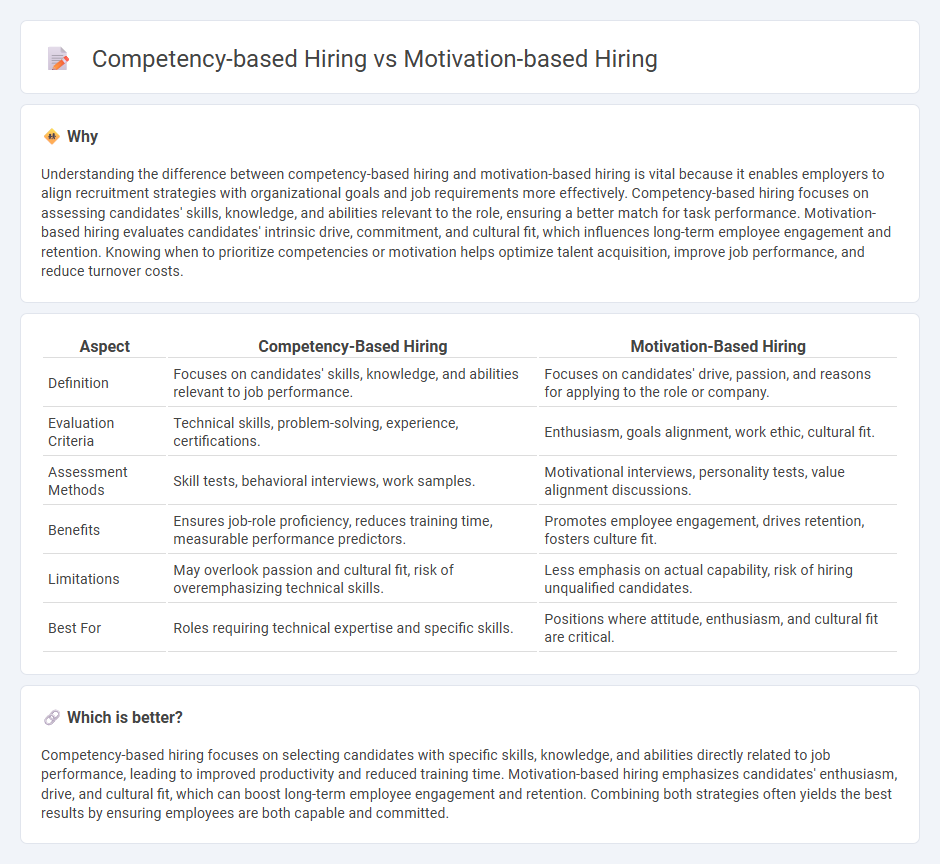
Competency-based hiring focuses on evaluating candidates' specific skills, knowledge, and abilities relevant to job performance, ensuring a precise match with organizational needs. Motivation-based hiring emphasizes candidates' drive, work ethic, and alignment with company culture to predict long-term engagement and productivity. Explore how combining these approaches can enhance recruitment strategies and optimize workforce effectiveness.
Why it is important
Understanding the difference between competency-based hiring and motivation-based hiring is vital because it enables employers to align recruitment strategies with organizational goals and job requirements more effectively. Competency-based hiring focuses on assessing candidates' skills, knowledge, and abilities relevant to the role, ensuring a better match for task performance. Motivation-based hiring evaluates candidates' intrinsic drive, commitment, and cultural fit, which influences long-term employee engagement and retention. Knowing when to prioritize competencies or motivation helps optimize talent acquisition, improve job performance, and reduce turnover costs.
Comparison Table
| Aspect | Competency-Based Hiring | Motivation-Based Hiring |
|---|---|---|
| Definition | Focuses on candidates' skills, knowledge, and abilities relevant to job performance. | Focuses on candidates' drive, passion, and reasons for applying to the role or company. |
| Evaluation Criteria | Technical skills, problem-solving, experience, certifications. | Enthusiasm, goals alignment, work ethic, cultural fit. |
| Assessment Methods | Skill tests, behavioral interviews, work samples. | Motivational interviews, personality tests, value alignment discussions. |
| Benefits | Ensures job-role proficiency, reduces training time, measurable performance predictors. | Promotes employee engagement, drives retention, fosters culture fit. |
| Limitations | May overlook passion and cultural fit, risk of overemphasizing technical skills. | Less emphasis on actual capability, risk of hiring unqualified candidates. |
| Best For | Roles requiring technical expertise and specific skills. | Positions where attitude, enthusiasm, and cultural fit are critical. |
Which is better?
Competency-based hiring focuses on selecting candidates with specific skills, knowledge, and abilities directly related to job performance, leading to improved productivity and reduced training time. Motivation-based hiring emphasizes candidates' enthusiasm, drive, and cultural fit, which can boost long-term employee engagement and retention. Combining both strategies often yields the best results by ensuring employees are both capable and committed.
Connection
Competency-based hiring focuses on evaluating candidates' specific skills and abilities that align with job requirements, while motivation-based hiring assesses a candidate's drive and alignment with organizational values. Both approaches complement each other by ensuring that employees not only possess the necessary expertise but are also intrinsically motivated to perform and grow within the company. Combining these methods enhances workforce effectiveness, engagement, and long-term retention.
Key Terms
Intrinsic Motivation
Motivation-based hiring prioritizes candidates' intrinsic motivation, emphasizing passion, drive, and personal alignment with company values to predict long-term engagement and productivity. Competency-based hiring concentrates on assessing specific skills and behaviors demonstrated through past experiences to meet job requirements effectively. Explore how leveraging intrinsic motivation can transform your recruitment strategy for deeper employee commitment and innovation.
Behavioral Competencies
Motivation-based hiring concentrates on understanding a candidate's intrinsic drive and passion, which can predict long-term engagement and cultural fit. Competency-based hiring emphasizes assessing behavioral competencies such as communication, problem-solving, and teamwork to ensure candidates possess the skills needed for specific roles. Explore more about how integrating both approaches can enhance talent acquisition strategies.
Cultural Fit
Motivation-based hiring emphasizes aligning candidates' intrinsic drives with company values to ensure cultural fit, enhancing long-term employee engagement and retention. Competency-based hiring prioritizes specific skills and experience but may overlook alignment with organizational culture, potentially impacting teamwork and morale. Discover how integrating both approaches can optimize hiring outcomes by balancing skills and cultural compatibility.
Source and External Links
The Evolution of Recruitment: Motivation-based Hiring - Motivation-based hiring focuses on recruiting candidates by assessing their motivation, drive, and cultural fit alongside skills, incorporating strategies such as employer branding and candidate engagement to attract high performers.
Motivation Based Interviewing - Motivation-Based Interviewing (MBI) is a hiring technique that prioritizes attitude and passion over skills, helping companies identify self-motivated, problem-solving high performers who contribute to lower turnover and stronger business results.
Motivation-based Interviewing | Talent and Culture - MBI is an effective method for identifying high performers by assessing candidates' skills, attitude, and passion, with training available to help supervisors ask the right questions and evaluate motivation and career fit.
 dowidth.com
dowidth.com